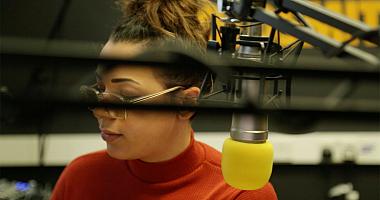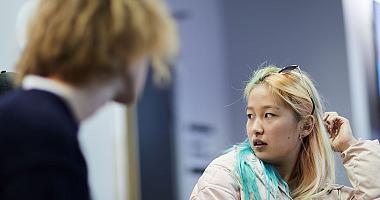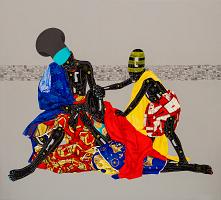MA
Film & Screen Studies
Content navigation menu
Why study MA Film & Screen Studies at Goldsmiths
Explore film philosophy, find out how images create meaning in experimental modes, and discover how we can think through the moving image on this eclectic Masters.
- This theory-led MA Film and Screen Studies course goes beyond the borders of a traditional film studies degree. We go back to the beginning of film history to explore what it means to fashion yourself in a moving image, or for society to see itself reflected.
- You’ll explore how images gain meaning from the past, to consider where they’re going next in terms of digital aesthetics, AI, and immersive interfaces.
- We’re interested in the cultural evolution of the moving image through the historical avant-garde, cinematic technology and culture, in both mainstream and underground filmmaking, to then contextualise contemporary and emerging screen cultures.
- You’ll engage deeply with philosophical approaches to film, where moving images represent, reflect and refract established ideas, but also generate a form of non-verbal thinking of their own. How do screen technologies impact on perception, feeling, and memory? How can we experimentally use them to think differently (or do they experiment on us)?
- This is not a film-making course, but as audiovisual media constitute more and more of our communication, you will have the opportunity to put your thoughts into audio-visual form on several modules.If you take this MA’s Media Arts Pathway, you can make your own DIY work and submit it as part of your assessment. Production values are not the focus–we’re interested in what you do with an idea.
- As part of the University of London, you will also have the chance to explore one option from the MA Film & Media programmes at other universities.
- You'll study in one of the top Media, Communications and Cultural Studies departments globally. We are ranked second in the UK for 'world-leading or internationally excellent' research (REF, 2021) and 16th in the world (third in the UK) in the 2024 QS World Rankings by Subject.
Contact the department
If you have specific questions about the degree, contact Daniel Strutt or Michael Goddard.
Length
1 year full-time or 2 years part-time
Entry requirements
You should have (or expect to be awarded) an undergraduate degree of at least 2:1 standard in a relevant/related subject. You might also be considered if you aren’t a graduate or your degree is in an unrelated field, but you have relevant experience and can show you can work at postgraduate level.
Fees
Home - full-time: £11250
Home - part-time: £5625
International - full-time: £22000
Department
What you'll study
The moving image media today are a concentrated form of culture, ideas, socialisation, wealth and power. 21st-century globalisation, ecology, migration and activism fight over and through them. How have the media built on, distorted and abandoned their past? How are they trying to destroy, deny or build the future? This pathway explores new critical approaches that address the currency of moving image media in today's global context – their aesthetics, technology and politics. It seeks to extend the boundaries for studying moving images by considering a wider range of media and introducing students to a wider range of approaches for investigating moving images' past and present.
The programme will be structured as follows:
- 60 credits of option modules
- 60-credit dissertation
- 60 credits of compulsory modules
The compulsory modules are:
| Module title | Credits |
|---|---|
| Archaeology of the Moving Image | 30 credits |
| Politics of the Audiovisual | 30 credits |
Optional modules
We offer a wide range of optional modules each year. For more information, please refer to our list of Media modules that have been available in previous years.
Note about optional modules (if available): The above is indicative of the typical modules offered, but is not intended to be construed or relied on as a definitive list of what might be available in any given year. The module content and availability is subject to change.
Intercollegiate options
Students can also take one option from the MA Film & Media programmes at other University of London colleges. Please contact Daniel Strutt, the Screen Studies Convenor at Goldsmiths for more details on how to take part in options at other colleges. Options taken under this scheme are deemed to count for 30 credits at Goldsmiths.
How you'll be assessed
The MA is assessed primarily through coursework essays and written projects. Practical modules may require audiovisual elements to be submitted. It will also include a dissertation of approximately 12,000 words.
Entry requirements
You should have (or expect to be awarded) an undergraduate degree of at least upper second class standard in a relevant/related subject.
You might also be considered if you aren’t a graduate or your degree is in an unrelated field, but have relevant experience and can show that you have the ability to work at postgraduate level.
International qualifications
We accept a wide range of international qualifications. Find out more about the qualifications we accept from around the world.
If English isn’t your first language, you will need an IELTS score (or equivalent English language qualification) of 6.5 with a 6.5 in writing and no element lower than 6.0 to study this programme. If you need assistance with your English language, we offer a range of courses that can help prepare you for postgraduate-level study.
How to apply
Apply directly to Goldsmiths using our online application system
Before submitting your application you’ll need to have:
- Details of your academic qualifications
- The email address of your referee who we can request a reference from, or alternatively a copy of your academic reference
- Copies of your educational transcripts or certificates
- A personal statement – this can either be uploaded as a Word Document or PDF, or completed online. Please indicate in your personal statement which pathway (Moving Image Studies or Media Arts) you are applying for. In your personal statement you will also need to demonstrate an awareness of the historical and contemporary significance of screen-based media and a willingness to accept the challenge of interdisciplinary study. Please see our guidance on writing a postgraduate statement.
You'll be able to save your progress at any point and return to your application by logging in using your username/email and password.
When to apply
We accept applications from October for students wanting to start the following September.
We encourage you to complete your application as early as possible, even if you haven't finished your current programme of study. It's very common to be offered a place that is conditional on you achieving a particular qualification.
Late applications will only be considered if there are spaces available.
If you're applying for funding you may be subject to an application deadline.
Selection process
Admission to many programmes is by interview, unless you live outside the UK. Occasionally, we'll make candidates an offer of a place on the basis of their application and qualifications alone.
Find out more about applying.
Fees and funding
Annual tuition fees
These are the PG fees for students starting their programme in the 2025/2026 academic year.
- Home - full-time: £11250
- Home - part-time: £5625
- International - full-time: £22000
If your fees are not listed here, please check our postgraduate fees guidance or contact the Fees Office, who can also advise you about how to pay your fees.
It’s not currently possible for international students to study part-time under a student visa. If you think you might be eligible to study part-time while being on another visa type, please contact our Admissions Team for more information.
If you are looking to pay your fees please see our guide to making a payment.
Funding opportunities
Explore the Goldsmiths scholarships finder to find out what funding you may be eligible for.
Paying your fees
Find out about paying your tuition fees.
If you are a UK student you may be eligible for a postgraduate loan.
Find out more about postgraduate fees and explore funding opportunities. If you're applying for funding, you may be subject to an application deadline.
Additional costs
In addition to your tuition fees, you'll be responsible for any additional costs associated with your course, such as buying stationery and paying for photocopying. You can find out more about what you need to budget for on our study costs page.
There may also be specific additional costs associated with your programme. This can include things like paying for field trips or specialist materials for your assignments. Please check the programme specification for more information.
Research
Theoretical analysis and practical creations
Research culture in the Department of Media, Communications and Cultural Studies is unique in that it draws on and brings together different disciplinary and intellectual traditions, approaches and perspectives rooted in the humanities and the social sciences, in theoretical analysis and practical creations, in critical readings and performance.
Our work spans topics and approaches from philosophical studies of technology and human life to sociological investigations of media production and use; from issues of identity, embodiment and becoming to post-feminism, queer theory and critical race studies; from global screen studies and transnational investigations of media and culture to news’ role in contemporary democracy.
Many of the projects undertaken within the Department are collaborative in nature - such as the work conducted under the umbrella of Goldsmiths Leverhulme Media Research Centre, funded with a 2006 Leverhulme grant to study the design and significance of various contemporary media spaces.
We have also received funding from AHRC, British Academy, British Council, Carnegie Trust UK, Council for British Research in the Levant, ESRC, EPSRC, Guggenheim Foundation, Higher Education Academy, Hong Kong Research Grants Council, JISC, London Centre for Arts and Cultural Exchange, Media Trust and Open Society Foundation.
As well as working on collaborative projects, we have published a number of books with high-impact international presses, on a diverse range of topics: affect and emotion, artificial intelligence, bioethics, the body and experience, branding, broadcasting, Chinese cinema, democracy, film history, the future of journalism, media geographies, the mediation of power, post-feminism, postcolonial politics, sound and voice.
Members of the Department edit leading academic journals, including 'Body and Society', 'Culture Machine', 'Global Media and Communication', 'International Journal of Cultural Studies', 'Subjectivity' and 'photographies'.
- The Leverhulme Trust funded Goldsmiths Leverhulme Media Research Centre
- Storycircle (Framework for Innovation and Research in MediaCityUK)
Four research strands
The MCCS research falls into four main strands, which make up our research groupings:
Gender, Feminism and Contemporary Culture
Connecting the long tradition of work within the Department on culture and representation, embodiment and affect, to its specific strengths in gender, race, sexuality and cultures of work.
Media and Democracy
Building on the work of the Centre for Global Media and Democracy and the Leverhulme programme on media’s contribution to democracy - including the changing nature of journalism and political communication.
Media Futures
Bringing together arts, humanities and social sciences approaches to understanding the changing role of media technologies in art, culture, economy and science, and the changing relation between the virtual and the material.
Screen Cultures and Media Arts
Consolidating the long-standing focus on screen cultures within the Department, as concentrated within the Leverhulme programme, combined with an expanded exploration of media arts such as photography, video, digital imagining, sound and performance.
Careers
Our graduates go on to work in areas such as programming and curating, film and video distribution, and film and television criticism, but many also create their own careers.
Approximately 20% of our graduates pursue PhD degrees.
The Careers Service provides central support for skills enhancement, running The Gold Award scheme and other co-curricular activities that are accredited via the Higher Education Achievement Report (HEAR).







.jpg)
